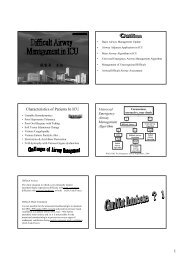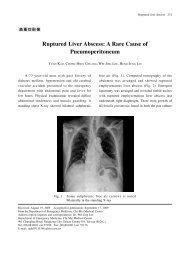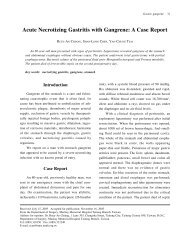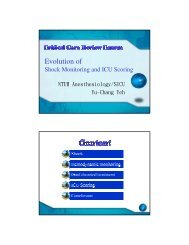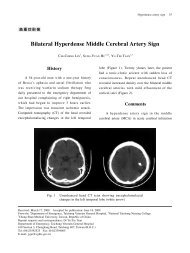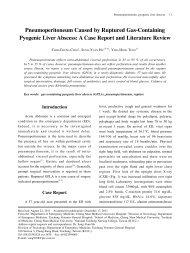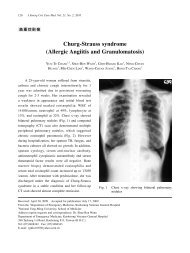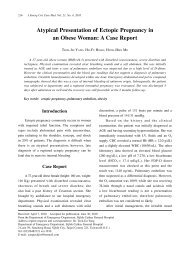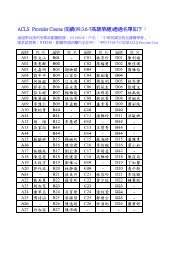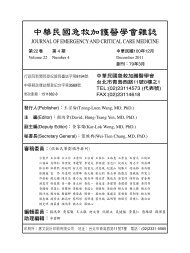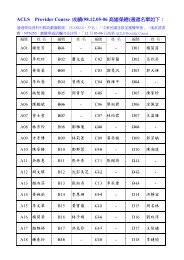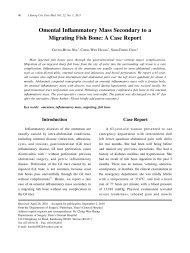S672 Circulation November 2, <strong>2010</strong> “greater good” that will benefit the living. An alternate viewpoint is that consent is unnecessary because the body is “non persona” and without autonomy or interests. These arguments, however, fail to adequately weigh the potential for harm to surviving family members who may oppose using a recently deceased loved one for the purpose of training or research. This view also ignores significant cultural differences in the acceptance or nonacceptance of the use of cadavers in medical education. The <strong>American</strong> College of Emergency Physicians practice guidelines summarizes the issues on their website, offering a more detailed discussion at http://www.acep.org/ content.aspx?id�30104 (accessed April 18, <strong>2010</strong>). 102 Guidelines Part 3: Ethics: Writing Group Disclosures Writing Group Member Employment Research Grant Laurie J. Morrison Gerald Kierzek Douglas S. Diekema Michael R. Sayre Scott M. Silvers Ahamed H. Idris Mary E. Mancini St Michael’s Hospital–Clinician Scientist, Director Rescu Robert and Dorothy Pitts Chair in Acute Care & Emergency Medicine Keenan Research Centre Li Ka Shing Knowledge Institute St Michael’s Hosp. Univ of Toronto Assistance Publique Hopitaux de Paris & Univ of Paris, Emerg Dept & EMS & Forensic Med, Hotel-Dieu Cochin Hosp; MD Children’s University Medical Group-Professor of Pediatrics The Ohio State University; Assoc Prof Mayo Clinic Chair Emergency Medicine UT Southwestern Medical Center at Dallas–Professor of Surgery Univ of Texas at Arlington, Professor Disclosures Ultimately, the respect for the individual should prevail over the need for healthcare providers to practice lifesaving techniques. The technical advances of high-fidelity simulation and the use of cadaver labs where consent has been obtained in advance should reduce the need for use of recently deceased patients for educational purposes. Acknowledgements Neonatal Task Force Chair Jeffrey M. Perlman for his contributions to the manuscript and Andrew H. Travers and Thomas D. Rea for their insightful review and editing. Other Research Support Speakers’ Bureau/ Honoraria Ownership Interest Consultant/ Advisory Board Other None None None None None None †Pitts Foundation/ StMichaels Hosp Toronto, 1 yr research Fellow Emerg Med CCM None None None *Steering Com (Study LMWH in traumatic injury) GSK None None None None None None none None None None None None None None None None None None †NIH grant for the Resuscitation Outcomes Consortium Dallas-Fort Worth Site. I serve as the site PI. All payments to UT SWMC, at which I’m employed *In kind support from Philips, Medtronics, and ZOLL consisting of defibrillators, software, and manikins used for training purposes None None None None None None None None None None None This table represents the relationships of writing group members that may be perceived as actual or reasonably perceived conflicts of interest as reported on the Disclosure Questionnaire, which all members of the writing group are required to complete and submit. A relationship is considered to be “significant” if (a) the person receives $10 000 or more during any 12-month period, or 5% or more of the person’s gross income; or (b) the person owns 5% or more of the voting stock or share of the entity, or owns $10 000 or more of the fair market value of the entity. A relationship is considered to be “modest” if it is less than “significant” under the preceding definition. *Modest. †Significant. Downloaded from circ.ahajournals.org at NATIONAL TAIWAN UNIV on October 18, <strong>2010</strong>
References 1. Guru V, Verbeek PR, Morrison LJ. Response of paramedics to terminally ill patients with cardiac arrest: an ethical dilemma. CMAJ. 1999;161:1251–1254. 2. Wiese CH, Bartels UE, Zausig YA, Pfirstinger J, Graf BM, Hanekop GG. Prehospital emergency treatment of palliative care patients with cardiac arrest: a retrolective investigation. Support Care Cancer. 2009. 3. Miller W, Levy P, Lamba S, Zalenski RJ, Compton S. Descriptive analysis of the in-hospital course of patients who initially survive outof-hospital cardiac arrest but die in-hospital. J Palliat Med. <strong>2010</strong>;13: 19–22. 4. ACEP Policy Statement: Code of Ethics for Emergency Physicians. Am College of Emergency Physicians. Available at: http://www.acep.org/ practres.aspx?id�29144. Accessed 5 May, <strong>2010</strong>. 5. Marco CA, Bessman ES, Schoenfeld CN, Kelen GD. Ethical issues of cardiopulmonary resuscitation: current practice among emergency physicians. Acad Emerg Med. 1997;4:898–904. 6. Marco CA, Bessman ES, Kelen GD. Ethical issues of cardiopulmonary resuscitation: comparison of emergency physician practices from 1995 to 2007. Acad Emerg Med. 2009;16:270–273. 7. ACEP statement: Code of Ethics for Emergency Physicians. 8. Schmid B, Allen RS, Haley PP, Decoster J. Family matters: dyadic agreement in end-of-life medical decision making. Gerontologist. <strong>2010</strong>; 50:226–237. 9. Barnato AE, Anthony DL, Skinner J, Gallagher PM, Fisher ES. Racial and ethnic differences in preferences for end-of-life treatment. J Gen Intern Med. 2009;24:695–701. 10. Beauchamp T, Childress J. Principles of Biomedical Ethics. 6th ed: Oxford University Press; 2008. 11. Simon JR. Refusal of care: the physician-patient relationship and decisionmaking capacity. Ann Emerg Med. 2007;50:456–461. 12. Wright AA, Zhang B, Ray A, Mack JW, Trice E, Balboni T, Mitchell SL, Jackson VA, Block SD, Maciejewski PK, Prigerson HG. <strong>Association</strong>s between end-of-life discussions, patient mental health, medical care near death, and caregiver bereavement adjustment. JAMA. 2008; 300:1665–1673. 13. Omnibus Budget Reconciliation Act of 1990, Pub. Law No. 1990; 101–508. 14. Silveira MJ, Kim SY, Langa KM. Advance directives and outcomes of surrogate decision making before death. N Engl J Med. <strong>2010</strong>;362: 1211–1218. 15. Cerminara KL, Bogin SM. A paper about a piece of paper. Regulatory action as the most effective way to promote use of physician orders for life-sustaining treatment. J Leg Med. 2008;29:479–503. 16. Payne JK, Thornlow DK. Clinical perspectives on portable do-notresuscitate orders. J Gerontol Nurs. 2008;34:11–16. 17. Venneman SS, Narnor-Harris P, Perish M, Hamilton M. “Allow natural death” versus “do not resuscitate”: three words that can change a life. J Med Ethics. 2008;34:2–6. 18. Diekema DS. Parental refusals of medical treatment: the harm principle as threshold for state intervention. Theor Med Bioeth. 2004;25:243–264. 19. Schneiderman LJ, Jecker NS, Jonsen AR. Medical futility: its meaning and ethical implications. Ann Intern Med. 1990;112:949–954. 20. Sherbino J, Guru V, Verbeek PR, Morrison LJ. Prehospital emergency medical services. CJEM. 2000;2:246–251. 21. Kellermann A, Lynn J. Withholding resuscitation in prehospital care. Ann Intern Med. 2006;144:692–693. 22. Feder S, Matheny RL, Loveless RS Jr, Rea TD. Withholding resuscitation: a new approach to prehospital end-of-life decisions. Ann Intern Med. 2006;144:634–640. 23. Morrison LJ, Visentin LM, Kiss A, Theriault R, Eby D, Vermeulen M, Sherbino J, Verbeek PR. Validation of a rule for termination of resuscitation in out-of-hospital cardiac arrest. N Engl J Med. 2006;355: 478–487. 24. Richman PB, Vadeboncoeur TF, Chikani V, Clark L, Bobrow BJ. Independent evaluation of an out-of-hospital termination of resuscitation (TOR) clinical decision rule. Acad Emerg Med. 2008;15:517–521. 25. Morrison LJ, Verbeek PR, Zhan C, Kiss A, Allan KS. Validation of a universal prehospital termination of resuscitation clinical prediction rule for advanced and basic life support providers. Resuscitation. 2009;80: 324–328. Morrison et al Part 3: Ethics S673 26. Ong ME, Jaffey J, Stiell I, Nesbitt L. Comparison of termination-ofresuscitation guidelines for basic life support: defibrillator providers in out-of-hospital cardiac arrest. Ann Emerg Med. 2006;47:337–343. 27. Sasson C, Hegg AJ, Macy M, Park A, Kellermann A, McNally B. Prehospital termination of resuscitation in cases of refractory out-ofhospital cardiac arrest. JAMA. 2008;300:1432–1438. 28. Ruygrok ML, Byyny RL, Haukoos JS. Validation of 3 termination of resuscitation criteria for good neurologic survival after out-of-hospital cardiac arrest. Ann Emerg Med. 2009;54:239–247. 29. Skrifvars MB, Vayrynen T, Kuisma M, Castren M, Parr MJ, Silfverstople J, Svensson L, Jonsson L, Herlitz J. Comparison of Helsinki and European Resuscitation Council “do not attempt to resuscitate” guidelines, and a termination of resuscitation clinical prediction rule for out-of-hospital cardiac arrest patients found in asystole or pulseless electrical activity. Resuscitation. <strong>2010</strong>. 30. Verbeek PR, Vermeulen MJ, Ali FH, Messenger DW, Summers J, Morrison LJ. Derivation of a termination-of-resuscitation guideline for emergency medical technicians using automated external defibrillators. Acad Emerg Med. 2002;9:671–678. 31. Morrison LJ, Visentin LM, Vermeulen M, Kiss A, Theriault R, Eby D, Sherbino J, Verbeek R. Inter-rater reliability and comfort in the application of a basic life support termination of resuscitation clinical prediction rule for out of hospital cardiac arrest. Resuscitation. 2007;74: 150–157. 32. Bailey ED, Wydro GC, Cone DC. Termination of resuscitation in the prehospital setting for adult patients suffering nontraumatic cardiac arrest. National <strong>Association</strong> of EMS Physicians Standards and Clinical Practice Committee. Prehosp Emerg Care. 2000;4: 190–195. 33. Morrison LJ, Verbeek PR, Vermeulen MJ, Kiss A, Allan KS, Nesbitt L, Stiell I. Derivation and evaluation of a termination of resuscitation clinical prediction rule for advanced life support providers. Resuscitation. 2007;74: 266–275. 34. Auerbach PS, Morris JA Jr, Phillips JB Jr, Redlinger SR, Vaughn WK. An analysis of ambulance accidents in Tennessee. JAMA. 1987;258: 1487–1490. 35. Kellermann AL, Hackman BB. Terminating unsuccessful advanced cardiac life support in the field. Am J Emerg Med. 1987;5:548–549. 36. Morrison LJ, Cheung MC, Redelmeier DA. Evaluating paramedic comfort with field pronouncement: development and validation of an outcome measure. Acad Emerg Med. 2003;10:633–637. 37. Gray WA, Capone RJ, Most AS. Unsuccessful emergency medical resuscitation: are continued efforts in the emergency department justified? N Engl J Med. 1991;325:1393–1398. 38. Suchard JR, Fenton FR, Powers RD. Medicare expenditures on unsuccessful out-of-hospital resuscitations. J Emerg Med. 1999;17:801–805. 39. Olasveengen TM, Wik L, Steen PA. Quality of cardiopulmonary resuscitation before and during transport in out-of-hospital cardiac arrest. Resuscitation. 2008;76:185–190. 40. Eisenberg MS, Mengert TJ. Cardiac resuscitation. N Engl J Med. 2001; 344:1304–1313. 41. Chung TN, Kim SW, Cho YS, Chung SP, Park I, Kim SH. Effect of vehicle speed on the quality of closed-chest compression during ambulance transport. Resuscitation. <strong>2010</strong>. 42. Loertscher L, Reed DA, Bannon MP, Mueller PS. Cardiopulmonary resuscitation and do-not-resuscitate orders: a guide for clinicians. Am J Med. <strong>2010</strong>;123:4–9. 43. Do Not Attempt Resuscitation (DNAR) Decisions in the Perioperative Period. London: The <strong>Association</strong> of Anaesthetists of Great Britain and Ireland; 2009. 44. Paris JJ. What standards apply to resuscitation at the borderline of gestational age? J Perinatol. 2005;25:683–684. 45. De Leeuw R, Cuttini M, Nadai M, Berbik I, Hansen G, Kucinskas A, Lenoir S, Levin A, Persson J, Rebagliato M, Reid M, Schroell M, de Vonderweid U. Treatment choices for extremely preterm infants: an international perspective. J Pediatr. 2000;137:608–616. 46. Jain L, Ferre C, Vidyasagar D, Nath S, Sheftel D. Cardiopulmonary resuscitation of apparently stillborn infants: survival and long-term outcome. J Pediatr. 1991;118:778–782. 47. Casalaz DM, Marlow N, Speidel BD. Outcome of resuscitation following unexpected apparent stillbirth. Arch Dis Child Fetal Neonatal Ed. 1998;78:F112–F115. 48. Laptook AR, Shankaran S, Ambalavanan N, Carlo WA, McDonald SA, Higgins RD, Das A. Outcome of term infants using Apgar scores at 10 Downloaded from circ.ahajournals.org at NATIONAL TAIWAN UNIV on October 18, <strong>2010</strong>
- Page 1 and 2: Circulation 2010;122;S640-S656 DOI:
- Page 3 and 4: ous disclosure and management of po
- Page 5 and 6: decrease the number of futile trans
- Page 7 and 8: essential bridge between BLS and lo
- Page 9 and 10: we continue to support a combinatio
- Page 11 and 12: ● Since 2005 considerable new dat
- Page 13 and 14: Guidelines Part 1: Executive Summar
- Page 15 and 16: implementation in UK intensive care
- Page 17 and 18: tation: risks for patients not in c
- Page 19 and 20: Circulation 2010;122;S657-S664 DOI:
- Page 21 and 22: S658 Circulation November 2, 2010 T
- Page 23 and 24: S660 Circulation November 2, 2010 T
- Page 25 and 26: S662 Circulation November 2, 2010 w
- Page 27 and 28: S664 Circulation November 2, 2010 N
- Page 29 and 30: Part 3: Ethics 2010 American Heart
- Page 31 and 32: DNAR Orders in OHCA Out-of-hospital
- Page 33 and 34: Criteria for Not Starting CPR in Pe
- Page 35: well. 87 Serum biomarkers such as n
- Page 39 and 40: 92. Ali AA, Lim E, Thanikachalam M,
- Page 41 and 42: Part 4: CPR Overview 2010 American
- Page 43 and 44: S678 Circulation November 2, 2010 t
- Page 45 and 46: S680 Circulation November 2, 2010 i
- Page 47 and 48: S682 Circulation November 2, 2010 G
- Page 49 and 50: S684 Circulation November 2, 2010 4
- Page 51 and 52: Part 5: Adult Basic Life Support 20
- Page 53 and 54: untrained bystander should—at a m
- Page 55 and 56: collapse of a victim or find someon
- Page 57 and 58: CPR until an AED arrives, the victi
- Page 59 and 60: (Class IIa, LOE C). A case series s
- Page 61 and 62: ‘support or refute oxygen use in
- Page 63 and 64: that it was helpful for relieving a
- Page 65 and 66: 20. Kuisma M, Boyd J, Vayrynen T, R
- Page 67 and 68: 103. Jost D, Degrange H, Verret C,
- Page 69 and 70: 196. Rea TD, Cook AJ, Stiell IG, Po
- Page 71 and 72: 274. Dolkas L, Stanley C, Smith AM,
- Page 73 and 74: Part 6: Electrical Therapies Automa
- Page 75 and 76: S708 Circulation November 2, 2010 b
- Page 77 and 78: S710 Circulation November 2, 2010 S
- Page 79 and 80: S712 Circulation November 2, 2010 a
- Page 81 and 82: S714 Circulation November 2, 2010 G
- Page 83 and 84: S716 Circulation November 2, 2010 5
- Page 85 and 86: S718 Circulation November 2, 2010 c
- Page 87 and 88:
Part 7: CPR Techniques and Devices:
- Page 89 and 90:
Interposed Abdominal Compression-CP
- Page 91 and 92:
series with concurrent controls 92
- Page 93 and 94:
Guidelines Part 7: CPR Techniques a
- Page 95 and 96:
57. Weiss SJ, Ernst AA, Jones R, On
- Page 97 and 98:
Part 8: Adult Advanced Cardiovascul
- Page 99 and 100:
S730 Circulation November 2, 2010 c
- Page 101 and 102:
S732 Circulation November 2, 2010 (
- Page 103 and 104:
S734 Circulation November 2, 2010 p
- Page 105 and 106:
S736 Circulation November 2, 2010 I
- Page 107 and 108:
S738 Circulation November 2, 2010 p
- Page 109 and 110:
S740 Circulation November 2, 2010 m
- Page 111 and 112:
S742 Circulation November 2, 2010 O
- Page 113 and 114:
S744 Circulation November 2, 2010 O
- Page 115 and 116:
S746 Circulation November 2, 2010 T
- Page 117 and 118:
S748 Circulation November 2, 2010 T
- Page 119 and 120:
S750 Circulation November 2, 2010 p
- Page 121 and 122:
S752 Circulation November 2, 2010 c
- Page 123 and 124:
S754 Circulation November 2, 2010 A
- Page 125 and 126:
S756 Circulation November 2, 2010 d
- Page 127 and 128:
S758 Circulation November 2, 2010 R
- Page 129 and 130:
S760 Circulation November 2, 2010 9
- Page 131 and 132:
S762 Circulation November 2, 2010 1
- Page 133 and 134:
S764 Circulation November 2, 2010 r
- Page 135 and 136:
S766 Circulation November 2, 2010 3
- Page 137 and 138:
Circulation 2010;122;S768-S786 DOI:
- Page 139 and 140:
patients usually require an advance
- Page 141 and 142:
comatose on arrival at the hospital
- Page 143 and 144:
istration to maintain the arterial
- Page 145 and 146:
Table 2. Common Vasoactive Drugs Dr
- Page 147 and 148:
potentials (SSEPs) and select physi
- Page 149 and 150:
Guidelines Part 9: Post-Cardiac Arr
- Page 151 and 152:
59. Larsson IM, Wallin E, Rubertsso
- Page 153 and 154:
142. Marcusohn E, Roguin A, Sebbag
- Page 155 and 156:
222. Rossetti AO, Oddo M, Liaudet L
- Page 157 and 158:
Part 10: Acute Coronary Syndromes:
- Page 159 and 160:
S788 Circulation November 2, 2010 p
- Page 161 and 162:
S790 Circulation November 2, 2010 E
- Page 163 and 164:
S792 Circulation November 2, 2010 i
- Page 165 and 166:
S794 Circulation November 2, 2010 T
- Page 167 and 168:
S796 Circulation November 2, 2010 a
- Page 169 and 170:
S798 Circulation November 2, 2010 P
- Page 171 and 172:
S800 Circulation November 2, 2010 e
- Page 173 and 174:
S802 Circulation November 2, 2010 p
- Page 175 and 176:
S804 Circulation November 2, 2010 c
- Page 177 and 178:
S806 Circulation November 2, 2010 (
- Page 179 and 180:
S808 Circulation November 2, 2010 8
- Page 181 and 182:
S810 Circulation November 2, 2010 a
- Page 183 and 184:
S812 Circulation November 2, 2010 2
- Page 185 and 186:
S814 Circulation November 2, 2010 d
- Page 187 and 188:
S816 Circulation November 2, 2010 C
- Page 189 and 190:
Part 11: Adult Stroke: 2010 America
- Page 191 and 192:
The time-sensitive nature of stroke
- Page 193 and 194:
(or the last time the patient was k
- Page 195 and 196:
Table 4. Inclusion and Exclusion Ch
- Page 197 and 198:
Guidelines Part 11: Stroke: Writing
- Page 199 and 200:
40. Zweifler RM, York D, et al. Acc
- Page 201 and 202:
Part 12: Cardiac Arrest in Special
- Page 203 and 204:
S830 Circulation November 2, 2010 P
- Page 205 and 206:
S832 Circulation November 2, 2010 A
- Page 207 and 208:
S834 Circulation November 2, 2010 T
- Page 209 and 210:
S836 Circulation November 2, 2010 m
- Page 211 and 212:
S838 Circulation November 2, 2010 b
- Page 213 and 214:
S840 Circulation November 2, 2010 c
- Page 215 and 216:
S842 Circulation November 2, 2010 a
- Page 217 and 218:
S844 Circulation November 2, 2010 C
- Page 219 and 220:
S846 Circulation November 2, 2010 e
- Page 221 and 222:
S848 Circulation November 2, 2010 t
- Page 223 and 224:
S850 Circulation November 2, 2010 D
- Page 225 and 226:
S852 Circulation November 2, 2010 a
- Page 227 and 228:
S854 Circulation November 2, 2010 1
- Page 229 and 230:
S856 Circulation November 2, 2010 2
- Page 231 and 232:
S858 Circulation November 2, 2010 3
- Page 233 and 234:
S860 Circulation November 2, 2010 4
- Page 235 and 236:
Circulation 2010;122;S862-S875 DOI:
- Page 237 and 238:
lood flow to vital organs and to ac
- Page 239 and 240:
short a pause in chest compressions
- Page 241 and 242:
Figure 4. Two thumb-encircling hand
- Page 243 and 244:
Oxygen Animal and theoretical data
- Page 245 and 246:
Disclosures Guidelines Part 13: Ped
- Page 247 and 248:
52. Hightower D, Thomas SH, Stone C
- Page 249 and 250:
147. Vilke GM, Smith AM, Ray LU, St
- Page 251 and 252:
Part 14: Pediatric Advanced Life Su
- Page 253 and 254:
S878 Circulation November 2, 2010
- Page 255 and 256:
S880 Circulation November 2, 2010 t
- Page 257 and 258:
S882 Circulation November 2, 2010 T
- Page 259 and 260:
S884 Circulation November 2, 2010 a
- Page 261 and 262:
S886 Circulation November 2, 2010 U
- Page 263 and 264:
S888 Circulation November 2, 2010
- Page 265 and 266:
S890 Circulation November 2, 2010 s
- Page 267 and 268:
S892 Circulation November 2, 2010
- Page 269 and 270:
S894 Circulation November 2, 2010 m
- Page 271 and 272:
S896 Circulation November 2, 2010 G
- Page 273 and 274:
S898 Circulation November 2, 2010 4
- Page 275 and 276:
S900 Circulation November 2, 2010 1
- Page 277 and 278:
S902 Circulation November 2, 2010 2
- Page 279 and 280:
S904 Circulation November 2, 2010 r
- Page 281 and 282:
S906 Circulation November 2, 2010 3
- Page 283 and 284:
S908 Circulation November 2, 2010 4
- Page 285 and 286:
Part 15: Neonatal Resuscitation 201
- Page 287 and 288:
Initial Steps The initial steps of
- Page 289 and 290:
mechanical ventilation of neonates
- Page 291 and 292:
to severe hypoxic-ischemic encephal
- Page 293 and 294:
Guidelines Part 15: Neonatal Resusc
- Page 295 and 296:
hospital cardiac arrests: a prospec
- Page 297 and 298:
Part 16: Education, Implementation,
- Page 299 and 300:
S922 Circulation November 2, 2010 T
- Page 301 and 302:
S924 Circulation November 2, 2010 T
- Page 303 and 304:
S926 Circulation November 2, 2010 G
- Page 305 and 306:
S928 Circulation November 2, 2010 7
- Page 307 and 308:
S930 Circulation November 2, 2010 1
- Page 309 and 310:
S932 Circulation November 2, 2010 m
- Page 311 and 312:
Part 17: First Aid: 2010 American H
- Page 313 and 314:
Table. International First Aid Scie
- Page 315 and 316:
Tourniquets Although tourniquets ha
- Page 317 and 318:
vinegar (4% to 6% acetic acid solut
- Page 319 and 320:
Guidelines Part 17: First Aid: Writ
- Page 321 and 322:
conventional manual compression: a
- Page 323 and 324:
150. Thomas J. Dermatology in the n



